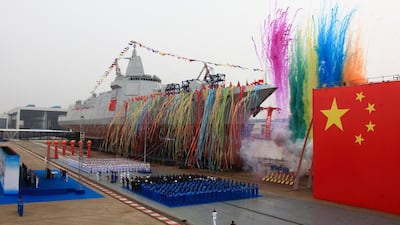Western power has lost its guaranteed superior edge to a combination of Chinese military expansion, Russia’s real-world application of force and well-drilled Iran-backed militias that have momentum in the Middle East, according to the International Institute of Strategic Studies (IISS).
The London-based think tank’s 2018 Military Balance finds while military spending is rising rapidly in the US and Europe, these countries no-longer enjoy a monopoly on innovation.
China now has the world’s biggest tank force and has added equivalent tonnage to Britain’s Royal Navy to its maritime forces in the last four years. Meanwhile, Russian investment in asymmetric tactics and capabilities means it is at the forefront of irregular conflict and interference in democratic politics.
While Tehran has an ageing military infantry, this is offset by its investment in ballistic missile developments and irregular forces.
Emile Hokayem, an IISS fellow, said that while Tehran had appeared to pull back from direct challenges to the US-led fleet presence in the Arabian Gulf, its meddling elsewhere was expanding.
“Iran continues to project power and influence, using the ambiguity of the battlefields in Syria and Yemen to test its strategies and introduce new technologies,” he said. “Iran wants to test its rivals.”
Proxy battles have been exploited by the nation and it is possible that Iran’s militias will end up in conflict with Israel from southern Lebanon as has been the case in Yemen.
“Iran is very good at using affiliate groups and elevating non-state groups above state actors to give them a strategic edge,” said John Raine, a director of the institute.
Faced with these threats, the established military powers will be increasing tempted to experiment with ‘leap-ahead’ technologies but this is an approach with no guarantee of success.
“It is inevitable that the military, diplomatic and economic balance of power will continue to shift,” said John Chipman, the IISS director. “The growing democratisation of technology will make it harder still, given the West no longer has a monopoly on world-leading defence innovation and production.”
Emerging weapons developments and broader defence-technological progress in China will further its transition from ‘catching up’ phase to a new role as a global defence innovator. Indeed, China might be the one to leap ahead.
A sharpening focus on nuclear weapons between the big powers is also evident. “China, Russia and the US all in the process of recapitalising and modernising their nuclear forces,” it said. “The ability to defeat missile defences is driving delivery-systems developments in China and Russia, with both countries pursuing hypersonic glide vehicles.”
Russia may be experiencing a slower than expected shift to new generations of weapons but it is gaining a boon from its deployment of its forces. “Moscow continues to demonstrate its willingness to use its forces close to home and abroad. In contrast to China, Russia is able to draw direct benefits from its real-world application of military power as it develops its equipment and personnel development plans,” the report said.
China’s great leap forward:
- Since 2000, China has built more corvettes, destroyers, frigates and submarines than Japan, South Korea and India combined;
- The total tonnage of new warships and auxiliaries launched by China in the last four years alone is significantly greater than the total tonnage of today's entire French navy;
- The launch of the first Type-055 cruiser indicates that the Chinese navy is closing another gap in its developing blue-water capabilities;
- China's navy is deploying further afield, including to Europe;
- Beijing's base in Djibouti will enable more naval deployments.


